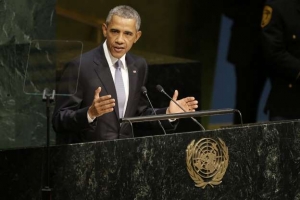 UNITED NATIONS (AP) — Straining for a solution to Syria’s civil war, President Barack Obama on Monday said the United States is willing to work with Russia, as well as Iran to achieve a “managed transition” to remove Syrian leader Bashar Assad from power.
UNITED NATIONS (AP) — Straining for a solution to Syria’s civil war, President Barack Obama on Monday said the United States is willing to work with Russia, as well as Iran to achieve a “managed transition” to remove Syrian leader Bashar Assad from power.
Syria cannot “return to the pre-war status quo,” Obama declared during his annual address to the United Nations General Assembly.
The president’s remarks underscore the tensions between the U.S. and Russia, Assad’s strongest ally. Assad’s future was expected to be a top issue during a rare face-to-face meeting late Monday between Obama and Russian President Vladimir Putin.
Putin was to address the U.N. General Assembly after Obama. He was expected to argue that Assad’s military is the most capable force for fighting the Islamic State — the extremist group with key strongholds in Syria and Iraq — and therefore needs to be strengthened.
Obama rejected Putin’s continued support for Assad, saying that simply arguing that the “alternative is surely worse” is not a solution to a crisis that has killed more than 250,000 people since it began in 2011, led to a flood of refugees and created a vacuum for the Islamic State and other extremist groups.
Despite Obama’s staunch opposition to Assad remaining in power, the U.S. has struggled to energize a political process to push him from power. Russia has long been a major obstacle, shielding Assad from U.N. sanctions and continuing to provide the Syrian government with weapons.
In fact, Russia has appeared to deepen its support for Assad in recent weeks, sending additional military equipment and troops with the justification that it is helping the government fight the Islamic State.
“There is no other solution to the Syrian crisis than strengthening the effective government structures and rendering them help in fighting terrorism,” Putin said in an interview with CBS’ “60 Minutes” that aired on the eve of his meeting with Obama.
Putin’s calls for strengthening Assad’s military come amid notable troubles for Obama’s plan to train and arm moderate rebels to fight the Islamic State in Syria. A $500 million Pentagon training program has resulted in just a handful of fighters to bolster airstrikes from a U.S.-led coalition.
The U.S. has agreed to talk with Russia about its military action in Syria. U.S. Defense Secretary Ash Carter spoke to his Russian counterpart about Syria earlier this month, the first military-to-military conversation in more than a year.
Addressing another area of tension with Russia, the U.S. president defended Western sanctions against Moscow for its actions supporting rebels in Ukraine. Obama said he wasn’t seeking a return to the Cold War, but argued that the United States couldn’t stand by while a nation’s sovereignty was being violated.
“If that happens without consequences in Ukraine, it could happen to any nation gathered here today,” Obama said.
The Ukraine crisis has indeed driven U.S.-Russian relations to post-Cold War lows. Russia annexed Crimea from Ukraine in 2014 and a pro-Russian armed insurgency continues in eastern Ukraine, with Kiev and NATO accusing Moscow of backing and supplying it.
A shaky peace deal for Ukraine was brokered in February by France and Germany, and Russia doesn’t want the United States to become engaged in those talks. Another four-way meeting of leaders of Russia, Ukraine, France and Germany is set to take place in Paris this weekend.
U.S. officials say Obama will stress to Putin the importance of local elections in Ukraine going forward in October without interference.










